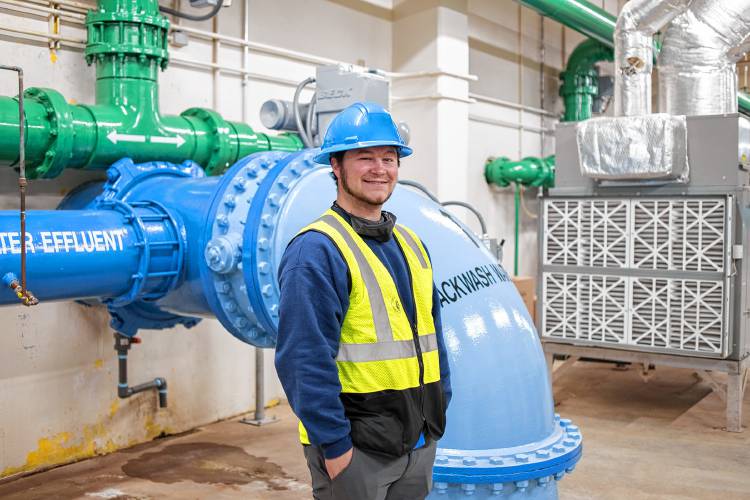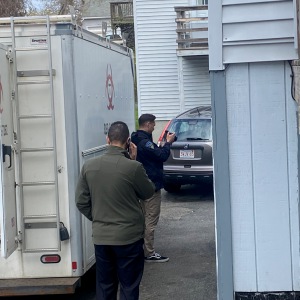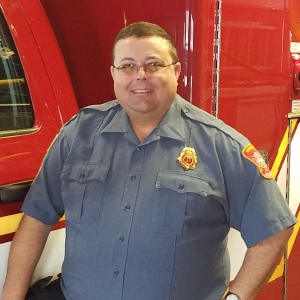My Turn: The state’s looming threat to water system resiliency — a shortage of water operators

Steve Hicks, drinking water perator for the Springfield Water & Sewer Commission. PIPE GALLERY PORTRAITS
| Published: 10-18-2023 6:49 PM |
A drinking water reservoir sparkles in glinted sunlight … while some in the community might not even be aware that this is where their drinking water comes from. Like almost every reservoir in the commonwealth this year, this one is full to the brim after a summer of plentiful rainfall. Yet for all this bountiful supply, I cannot help but think about a looming shortage — qualified professionals to manage these systems.
Though we may hear about drought more often than necessary in the news, a less obvious, and potentially more impactful issue has been rippling through the drinking water sector since before the pandemic: the critical shortage of skilled water operators entering our profession.
“Imagine a Day Without Water,” marked on Oct. 19, is a time to pause and reflect on what would happen if we had no water. Imagine turning on the tap and having no clean water flowing freely for your morning coffee or shower. Without water operators, this is exactly what would happen. As a society, we take reliable water service for granted, and we give little thought to the immense amount of work that it takes to bring it to your tap.
The role of a water operator in the delivery of your drinking water cannot be underestimated. These are the guardians of our most precious resource, working 24/7 to ensure that the water that reaches our taps is of the highest quality for consumption. However, Massachusetts, like many states, is grappling with an aging workforce in the water sector. More than half of our licensed drinking water operators are over the age of 50, meaning that a considerable number are nearing retirement, creating a void in experience and expertise that will be difficult to quickly fill.
One contributing factor is the lack of awareness about the profession among young people. Water operations is a “green” career that often flies under the radar. As an industry, we recognize it is crucial to collaborate with the education system in order to build a pipeline of future water operators.
Scholarships, internships, and job shadowing can pique the interest of the younger generation. Springfield Water & Sewer Commission hosted a highly successful “Pipeline” program this summer for selected high school students that can serve as a model for other local and regional utilities. Our association is partnering with technical high schools’ adult education programs later this month to offer night courses to attract those who may be looking for a new career opportunity.
We also recognize the technical nature of water operations can be daunting for newcomers. Therefore, we must invest in comprehensive training programs that provide both theoretical knowledge and practical experience without great expense to candidates. By nurturing a skilled workforce, Massachusetts can ensure a seamless transition from experienced operators to the next generation.
These programs are helping to expand the visibility of the water profession to the future workforce, but we need to them scale up faster. Funding at the state level can accelerate these solutions. At the local level, competitive wages and benefits for public water operators need to be made a priority, just as they are for our other public safety employees. By emphasizing the significance of this role, we can make it a more appealing career choice for young professionals.
Article continues after...
Yesterday's Most Read Articles
 Authorities ID victim in Greenfield slaying
Authorities ID victim in Greenfield slaying
 State records show Northfield EMS chief’s paramedic license suspended over failure to transport infant
State records show Northfield EMS chief’s paramedic license suspended over failure to transport infant
 Police report details grisly crime scene in Greenfield
Police report details grisly crime scene in Greenfield
 New buyer of Bernardston’s Windmill Motel looks to resell it, attorney says
New buyer of Bernardston’s Windmill Motel looks to resell it, attorney says
 McGovern, Gobi visit development sites in Greenfield, Wendell
McGovern, Gobi visit development sites in Greenfield, Wendell
 High schools: Seventh-inning rally helps Turners Falls softball edge Frontier 6-3 (PHOTOS)
High schools: Seventh-inning rally helps Turners Falls softball edge Frontier 6-3 (PHOTOS)
Water professionals hold the key to public health. Their work directly impacts the well-being of communities and the preservation of natural resources. ChatGPT can’t fix a water main break. And Siri can’t run a water filtration plant.
Let’s not wait until the tap runs dry to start investing in human capital for the only utility upon which life literally depends. And take some time on Oct. 19 to thank your local water utility for the essential service they provide; I know those operators working behind the scenes will appreciate the recognition.
Jennifer Pederson is executive director ot the Massachusetts Water Works Association, a membership organization dedicated to the advancement of the drinking water profession. Through education and advocacy, MWWA is committed to protecting public health and promoting a safe and sufficient supply of drinking water to Massachusetts consumers.

 The World Keeps Turning: Quantifying happiness — How we measure up
The World Keeps Turning: Quantifying happiness — How we measure up  My Turn: Dear Patients — We hear you!
My Turn: Dear Patients — We hear you! Ava Gips: Carolyn Shores Ness gets things done
Ava Gips: Carolyn Shores Ness gets things done Annette Pfannebecker: Vote yes for Shores Ness and for Deerfield
Annette Pfannebecker: Vote yes for Shores Ness and for Deerfield
